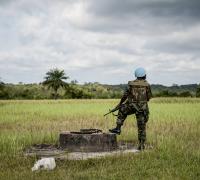Vigilante groups of Ghana’s political parties pose a serious threat to security in the country
By Kwesi Aning, Professor, Kofi Annan International Peacekeeping Training Center (KAIPTC)
& Peter Albrecht, Senior Researcher, DIIS
When looking at West Africa, one of the first things that comes to mind is the instability that has characterized the subcontinent since the Cold War ended. In the 1990s, countries like Sierra Leone and Liberia attracted the attention of the international press, due to state collapse, extreme violence, and war. Today, it is the Sahel, especially Mali, and the rising threat of jihadist violence that dominate media coverage.
Outside West Africa, discussions are rarely about the challenges that the region faces unless it relates to open conflict.
Increasing politicization of Ghana's security apparatus
Over the years, and especially for the past thirty years, Ghana has represented the hope of greater regional stability, exhibiting democratic governance, and economic growth. Despite this, Ghana is also showing signs of tension in the political system. For instance, this is reflected in increasing political interference in how the Ghana Police Service operates. Recruitments into the police depend on knowing a person who has political connections, which is a big difference from twenty years ago where the process was more open. As one police officer in Accra explained in early 2019, “the population keeps growing, and job opportunities are not huge. People who have affiliation with the party [in power] will use that to get employment [in the police].”
Likewise, powerful individuals, often politicians, interfere with who can and should be arrested, investigated, and ultimately prosecuted. This means that confidence in the Ghanaian police is at an all-time low, both among politicians and in the population – unless an individual supports the party in power and can benefit from the system. What is called a ‘transformation agenda’ was initiated for the GPS in early 2018, but with no strategy or funding to support it.
The rise (and rise) of political vigilante groups
One of the consequences of the increasing politicization of the police in Ghana, and the distrust that results from it, is that the political parties are setting up and consolidating groups that in Ghana are referred to as ‘political vigilantes.’ This applies both to the current ruling party, the National Patriotic Party (NPP), and the largest opposition party, the National Democratic Congress (NDC).
The phenomenon has intensified, is being widely debated in the Ghanaian media, and is considered to be one of the key threats to the democratic process, especially with regard to the upcoming elections in December 2020. Because the police are under such considerable political control, they cannot confront these politically motivated and controlled security groups. This is also because the vigilantes are better equipped than the average police officer, both when it comes to weapons and transportation.
Outside the police headquarters hangs a banner, stating that "vigilantism is a threat to our democracy,” but apart from sending signals, the police’s ability to act is limited.
These groups are not a new phenomenon, just as political control of and interference in police affairs are embedded in history. From the first attempts at democratic elections in 1951 – when Ghana still was under British rule – until the 2016 elections, they have existed. They are known for being willing to use violence to improve the chances of winning of the political party they serve. In Accra, Ghana's capital, they are often recruited from the poor areas of the city where, for relatively little money, young men are willing to mobilize into what often constitute groups of thugs.
They choose names that are associated with power and fear such as Pentagon, Al-Qaeda, Al-Jazeera, and NATO Forces. These names, associated with international news, war, security and terrorism, make them appear both all-powerful and invincible.
An independent factor of power?
What is new about these groups, and sets them apart from vigilantes in the past, is how dominant they have become in Ghana’s political process. Moreover, they are showing signs of independence from the political parties and politicians that they were established to support.
On the one hand, they are now used internally in the parties to threaten competitors. This is the case where promises of kickbacks and personal favors have been made before an election, for instance, or privately, and not complied with. Individuals and groups invest resources, time, and energy in the political parties, sometimes all the resources they have. This is done in the hope of reaping political, economic, and social benefits if the party they support gains power.
On the other hand, the vigilante groups are increasingly decentralized and copied across the country. This makes it more difficult to control them, which emphasizes their more independent stature.
The groups also undergo their own internal changes, partially based on the experiences they have from the authority they get from using violence as a political tool. They originate from the political parties, but because they are increasingly detached from their starting point, they can potentially be hijacked and infiltrated by groups that will use them against the state.
It is limited what can be done to reduce the role of the political vigilantes in the upcoming general elections, about six months away. President Nana Akufo-Addo established the Emile Short Commission of Inquiry on 8 February 2019 to begin unravelling what is essentially growing political violence in the country. He also got parliament to enact the Vigilantism and Related Offences Act in 2019, providing for prohibition of vigilantism in all its forms. It will be demonstrated how effective these two initiatives have been during December’s elections.
Certainly, they do not address deeper historical and structural reasons why political vigilante groups have emerged. To do so requires that political interference in how the police does business is reduced. As in so many other countries with large poor and young populations, it also requires a more equal distribution of resources. Despite Ghana's track-record, the country’s stability is not a foregone conclusion.
Not a new conflict in West Africa, but…
With the economic crisis that will inevitably come in the wake of the COVID-19 pandemic, it is worth keeping an eye on how the political vigilantes develop in the months to come. If the economy is squeezed, and there are fewer jobs for the average Ghanaian youth, the pressure will mount on the public service – and the political parties. If neither can deliver, frustrations will undoubtedly increase. The mobilization of frustrated youth, usually young men, has led to conflict in other parts of West Africa, for instance in Sierra Leone.
The Ghanaian government, but also international partners, should take the phenomenon of political vigilantes in Ghana seriously so that the country can remain as relatively stable as it has been since independence in the 1950s. This is no mean feat considering the instability that has characterized West Africa – and still is.
This DIIS comment has been produced as part of the project Domestic Security Implications of Peacekeeping in Ghana (D-SIP), funded by the Danish Ministry of Foreign Affairs. A shorter Danish version was printed in the newspaper Jyllands-Posten
DIIS Experts


